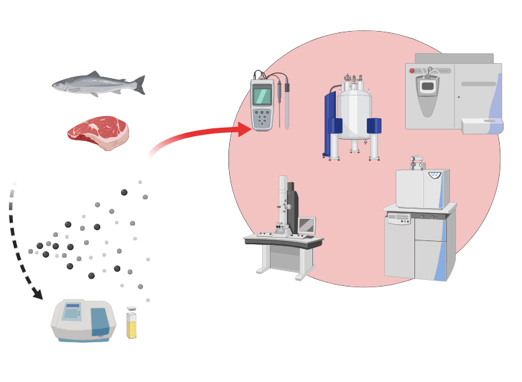This project seeks to develop a rapid detection ‘system’ that can screen many varieties of food or beverages for plastic contamination.
Project title: You Are What You Eat – Rapid Detection of (Nano)Plastics in Food.
Project dates: The project is ongoing (we will be aiming to recruit a team for this area)
Grants and funding: PhD Scholarship
Description
Plastics in the environment have been deemed a major global issue, with media and research attention focussing on the impact of microplastics.1 The International Union of Pure and Applied Chemistry (IUPAC) defines plastics as a generic term used in the case of “polymeric material that may contain other substances to improve performance and/or reduce costs”. The recalcitrant nature of plastics and their ensuing accumulation, with deleterious ecotoxicological effects, namely in the aquatic environment, are a focus for many groups in Australia, and globally.2 Typical sampling requires capturing the plastics from a matrix, sorting, then characterising the plastics, making analytical and quality checks an issue. In the laboratory, microplastics and quali-quantification risk being over or underestimated if careful sampling protocols are not executed. Furthermore, smaller sized nanoplastics are under-reported; representing new challenges as these are not seen by the naked eye. Despite the sudden surge in research, adulteration of plastics in complex matrices (such as food) remains a significant issue and requires several stages to quantify and qualify the plastic contamination, Figure 1.
 Plastic analysis requires a number of analytical techniques and intense method development in order to gain meaningful data. What if we can develop a rapid single method to encompass all of the other instruments?
Plastic analysis requires a number of analytical techniques and intense method development in order to gain meaningful data. What if we can develop a rapid single method to encompass all of the other instruments?
References
(1) Gangadoo, S.; Owen, S.; Rajapaksha, P.; Plastaid, K.; Cheeseman, S.; Haddara, H.; Truong, V. K.; Ngo, S. T.; Vu, V. V.; Cozzolino, D. Nano-plastics and their analytical characterisation and fate in the marine environment: From Source to Sea. Science of The Total Environment 2020, 138792.
(2) da Costa, J. P.; Santos, P. S. M.; Duarte, A. C.; Rocha-Santos, T. (Nano)plastics in the environment – Sources, fates and effects. Science of The Total Environment 2016, 566-567, 15.
Rationale
The project is an international project. Plastic contamination is a global issue, and we are seeing plastic contamination in food, at increased and concerning levels. Detection of plastics in our food is not something that can be performed rapidly. This project seeks to develop a rapid detection ‘system’ that can screen many varieties of food or beverages for plastic contamination.
Key people
- Dr James Chapman (RMIT)
- Professor Daniel Cozzolino (UQ)
- Dr Margaret McCaul (Dublin City University, Ireland)
- Dr Timothy Sullivan (University College Cork (UCC), Ireland)
Associated journal publications
Rapid measurement of microplastic contamination in chicken meat by mid-infrared spectroscopy and chemometrics: A feasibility study - https://doi.org/10.1016/j.foodcont.2020.107187


